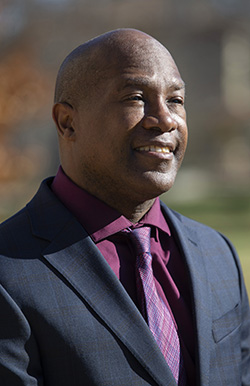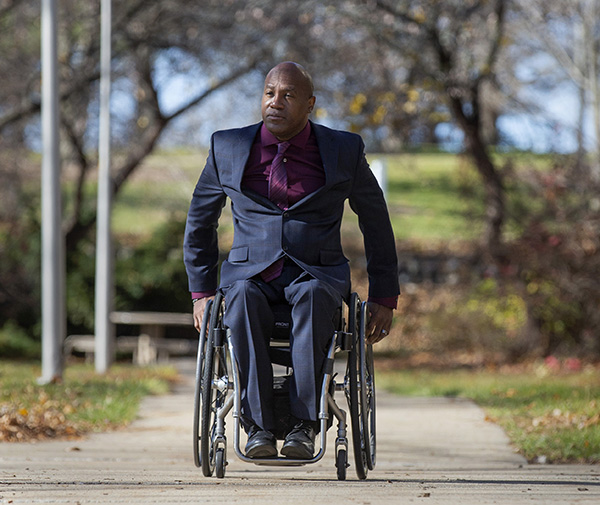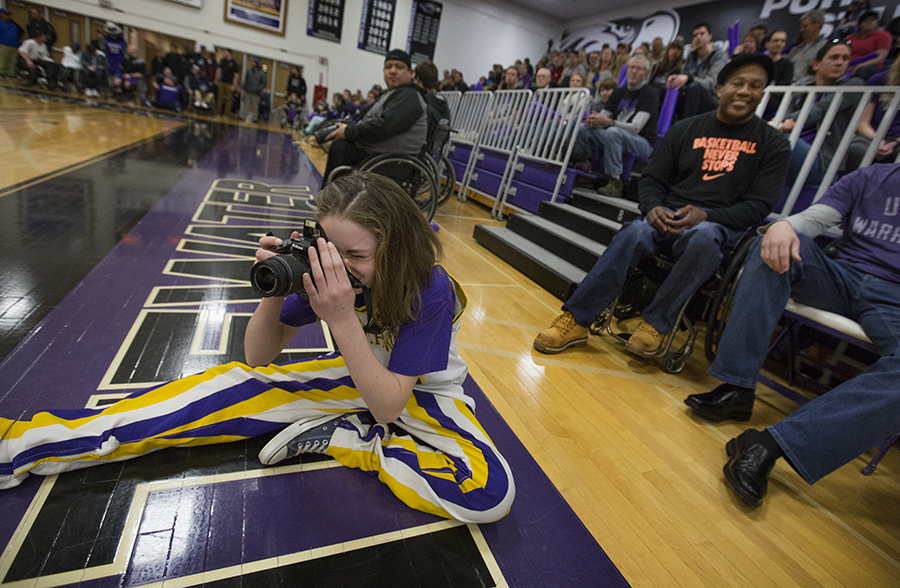UW-Whitewater 2020 commencement speaker is Melvin Juette
December 07, 2020

When Melvin Juette’s parents drove him from the south side of Chicago to the University of Wisconsin-Whitewater and dropped him off for the first time, they said, “You’re going to love it here.”
Juette, who grew up in an urban environment, wasn’t so sure.
“It was really dark!” he said, referring to the night sky and fewer streetlights illuminating the small town.
He struggled to find his place on a campus where, he says, no one at the time seemed to looked like him: Black and in a wheelchair. At the age of 16, Juette survived an altercation with a gang member, who shot him in the back.
On campus, the high school honor student who’d been recruited to the wheelchair basketball team initially failed to balance schoolwork and the demands of the athletics program.
“I struggled academically because I wasn’t prepared. On top of that I struggled with time management: I practiced every day and the team traveled. I ended up flunking out and missed my first chance to be on the U.S. national wheelchair basketball team. Instead, I had to do summer classes.”
Allen Einerson with Academic Support Services ended up helping him in that first summer class, and eventually developing a study skills class based on it.
“He had me reading — my first book was ‘The Godfather’ — and he had me do a research paper — all the things I was lacking, that I didn’t learn in high school.”
To help fund his education, he had a summer job working in a factory.
“I knew this is not what I wanted to do. One day a probation agent came to a class I was taking, and I thought ‘I’d like to do this.’ My advisor knew someone at the Department of Corrections, and I got a summer internship there and decided to major in social work.”
Juette learned better time management and became a better student — and then a better athlete. He played on the U.S. national wheelchair basketball team and went on to earn two bronze medals at the Paralympics, in Atlanta in 1996 and in Sydney, Australia, in 2000.
“Wheelchair basketball helped me move beyond being a victim of gang violence. It introduced me to a world where I can dream, believe and achieve.”

Melvin Juette on the UW-Whitewater campus on Nov. 11, 2020, on his way to recording his commencement address. (UW-Whitewater photo/Craig Schreiner)
Juette earned a B.A. in social work with a minor in criminal justice in 1992. His first role after graduation was as a probation and parole agent with the Wisconsin Department of Corrections. After a two-year stint as transition coordinator with UW-Whitewater, he was hired in 1998 to be the community service coordinator for the Deferred Prosecution Program in the Dane County District Attorney’s Office, a program that diverts about 1,000 people out of the criminal justice system every year, with a success rate of 75%. He was promoted to director of the program in 2017.
“I still run into a lot of clients, and they say ‘you changed my life.’ People shouldn’t be defined by the worst thing they’ve ever done. You need to treat them with respect, treat them fairly. I try to balance holding them accountable with how do you work with that person, get them to where they need to go.”
He has also served as assistant coach of the U.S. wheelchair basketball team that earned a bronze medal in London in the 2012 Paralympics and is a co-author of the book "Wheelchair Warrior," along with UW-Whitewater Professor Emeritus Ron Berger.
Juette met his wife, Sheila, when she was working as an intern with the wheelchair athletics program. In 1996, she earned a BSE in physical education K-12 with a minor in recreation and leisure education. They live in Whitewater and have seven adopted children who range in age from six to 16. In addition, they have fostered more than 80 children, who remain members of their family.
“Working in criminal justice, I’d ask kids, what would you change if you could change it? Mostly they talked about wanting to have a connection to their family, and how their life might have been different if they had. That’s when my wife and I thought, ‘we can provide that environment.’ So, we’ve fostered more than 80 kids. And we always tell them, ‘You are always a part of our family.’”

Melanie Juette, left, wears the UW-Whitewater men's wheelchair basketball uniform worn by her father Melvin Juette, behind her at right, when he played for the Warhawks in the early 1990s. They were attending a national intercollegiate wheelchair basketball championship game in March 2017. (UW-Whitewater photo | Craig Schreiner)
As a result of their commitment, the Juettes were named Hometown Heroes in 2020.
Juette credits his success to those who have paved the way for him and the adversities he’s faced.
“My life is phenomenal. I am the person I am because of what I dealt with. Had I not dealt with that adversity, I wouldn’t be here today. I wouldn’t be the director of the Deferred Prosecution Program. I wouldn’t be a published author. I wouldn’t be a father. I wouldn’t be a great son. I wouldn’t be a great husband. Because I had to experience those things.”
